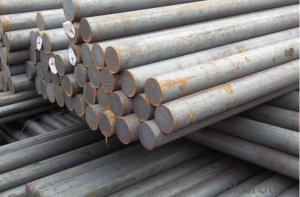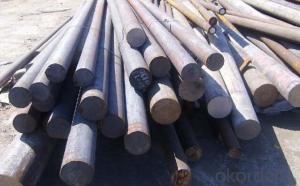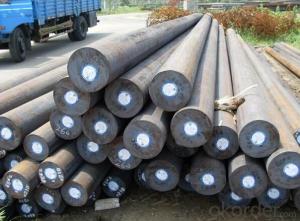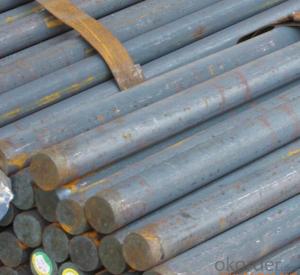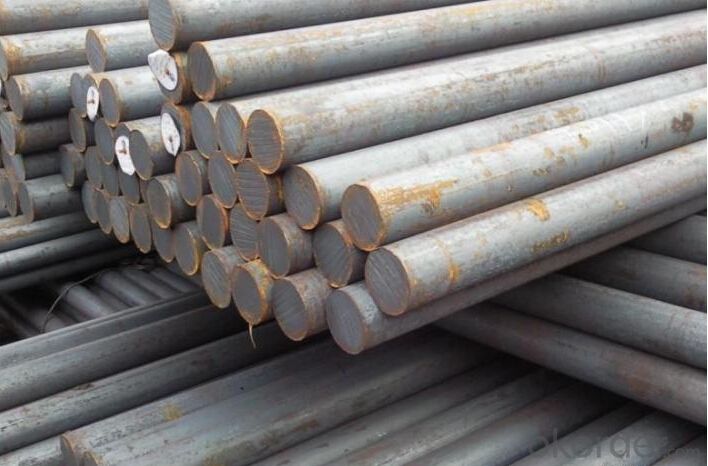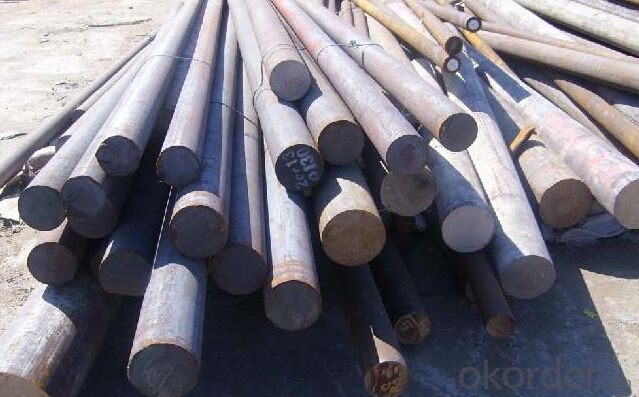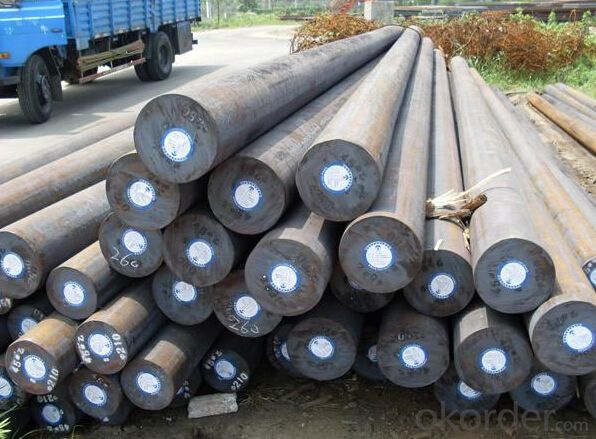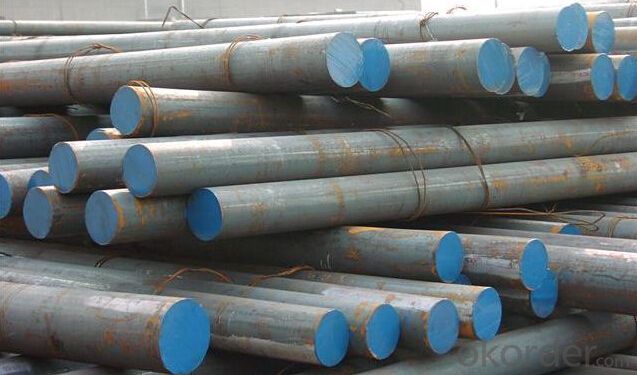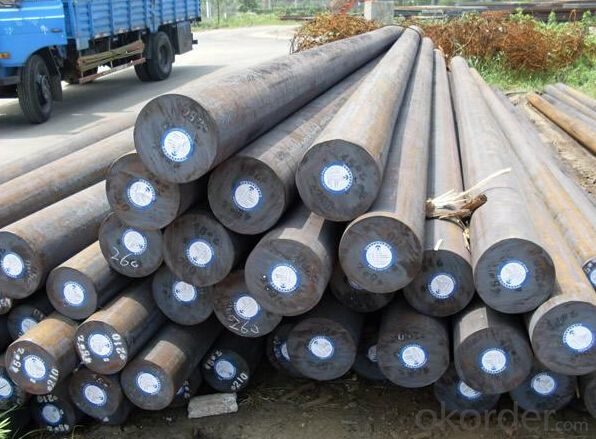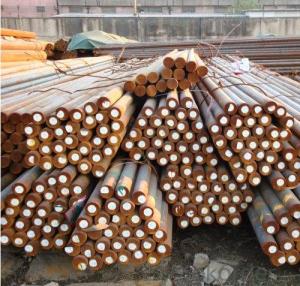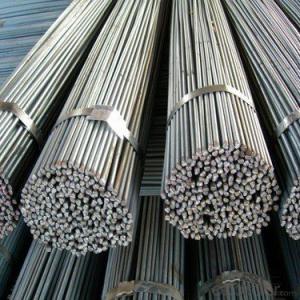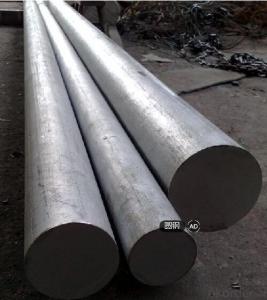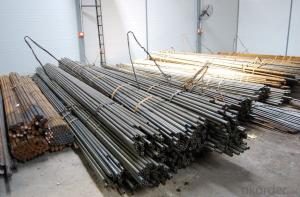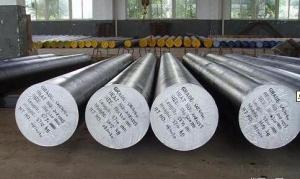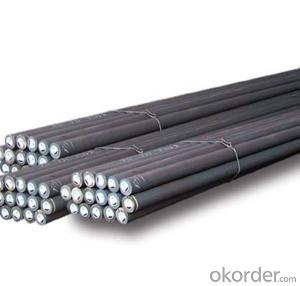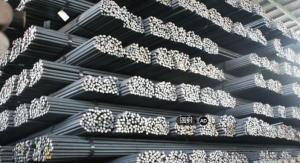Grade DIN1.2601 /Cr12MoV Die Steel Round Bar
- Loading Port:
- Tianjin
- Payment Terms:
- TT OR LC
- Min Order Qty:
- 3 m.t.
- Supply Capability:
- 10000 m.t./month
OKorder Service Pledge
OKorder Financial Service
You Might Also Like
Specification
Grade DIN1.2601 /Cr12MoV Die Steel Round Bar
Name | Carbon Steel Round Bar |
Shape | Round Bar/Square Bar/Flat Bar/Plate/Wire |
Standard | GB/ASTM/SAE/AISI/DIN/JIS/EN/BS |
Surface Treatment: | Black/Peeling/Polished/Machined |
Delivery Condition: | Hot Rolled or Forged/Peeled or Black Surface |
Test | SGS/UT 100% Elements Testing |
Certificate: | ISO/Mill Certificate |
Service: | 24 hours online service / |
more than 20 years trading and manufacture | |
Quality Assurance: | the third party inspection, such as SGS, BV, TUV…etc. is acceptable |
Packaging Details: | seaworthy packaging or as per customer's packing instruction |
Specification
Product Name: | Steel bar 1.2601 Cr12MoV D5 Die steel bar prices | ||||||||
Steel Grade: |
|
| AISI | DIN | GB |
|
|
| |
|
| D5 | 1.2601 | Cr12MoV |
|
|
| ||
Chemical compositions: | C | Mo | Mn | V | Cr | Si | S | P | |
1.45-1.75 | 0.4-0.6 | ≤0.40 | 0.15-0.3 | 11.0-12.5 | ≤0.40 | ≤0.03 | ≤0.03 | ||
Specification: | Flat Bar | Thickness:5-410mm | Width:50-810mm | ||||||
Round Bar | Diameter:12-610mm | ||||||||
Length Range: | 2500mm-5800mm | ||||||||
Delivery condition: | Hot rolled annealed steel in Black surface | ||||||||
Packaging & Delivery
Packaging Detail | Sea worthy packing /as per customer's packing instruction |
Delivery Detail | 15 ~ 40 days after receiving the deposit |
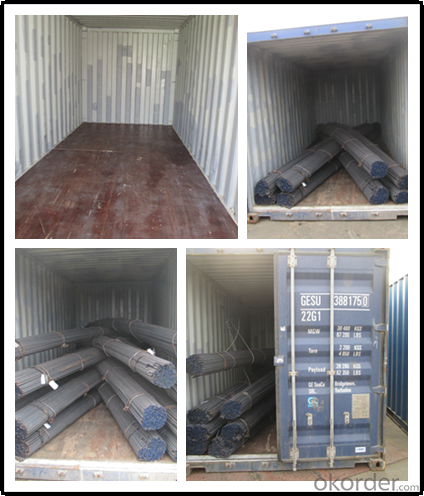
Product Show
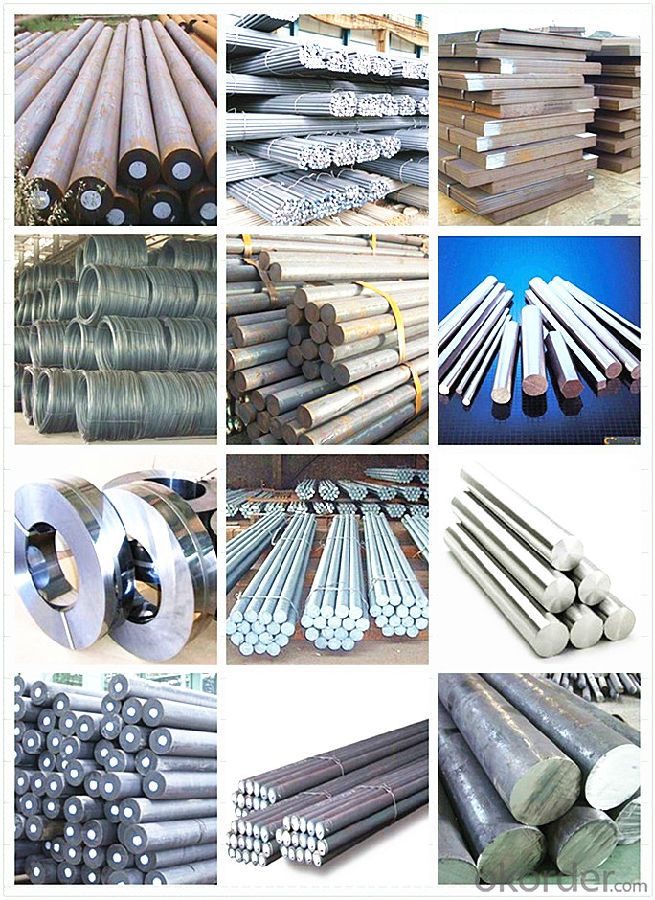
Workshop
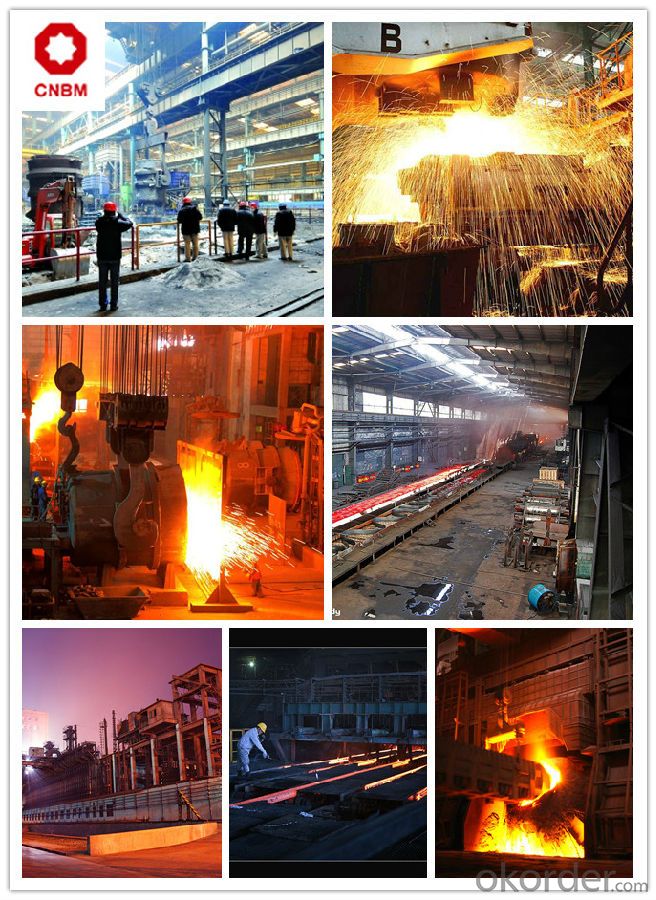
FAQ
Are you a trading company or manufacturer? | Manufacturer |
What’s the MOQ? | 3 metric ton |
What’s your delivery time? | 15-35 days after downpayment received |
Do you Accept OEM service? | Yes |
what’s your delivery terms? | FOB/CFR/CIF |
What's the Payment Terms? | 30% as deposit,70% before shipment by T/T |
Western Union acceptable for small amount. | |
L/C acceptable for large amount. | |
Scrow ,Paybal,Alipay are also ok | |
Why choose us? | Chose happens because of quality, then price, We can give you both. |
Additionally, we can also offer professional products inquiry, products knowledge train (for agents), smooth goods delivery, excellent customer solution proposals. | |
What's your available port of Shipment? | Main Port, China |
What’s your featured services? | Our service formula: good quality+ good price+ good service=customer's trust |
Where are your Market? | Covering more than 160 countries in the world |
- Q: How does special steel perform in radiation shielding applications?
- Special steel is widely recognized for its exceptional performance in radiation shielding applications. Its unique properties and composition make it an ideal choice for protecting against harmful radiation. One of the key advantages of special steel is its high density, which enables it to effectively absorb and attenuate radiation. This property allows it to act as a barrier, preventing the penetration of harmful radiation into sensitive areas. Special steel can significantly reduce the amount of radiation exposure, making it an essential material in various industries, including nuclear power plants, medical facilities, and aerospace applications. Furthermore, special steel possesses excellent mechanical strength and durability, which ensures long-lasting and reliable radiation shielding. It can withstand extreme conditions and maintain its shielding effectiveness over time. This durability is crucial, especially in environments where radiation exposure is continuous or ongoing. Moreover, special steel is highly resistant to corrosion and degradation, which is essential in radiation shielding applications. It ensures that the material remains intact and capable of providing the necessary protection against radiation for an extended period. This resistance to corrosion also reduces the need for frequent maintenance and replacement, resulting in cost savings and enhanced operational efficiency. In addition to its physical properties, special steel can be tailored to specific requirements, allowing for custom designs and configurations. This flexibility enables the development of radiation shielding solutions that are optimized for the unique needs of different applications. Whether it is the design of shielding panels, containers, or enclosures, special steel can be adapted to provide the most effective and efficient radiation protection. Overall, special steel performs exceptionally well in radiation shielding applications due to its high density, mechanical strength, durability, corrosion resistance, and customization capabilities. It offers reliable and long-lasting radiation protection, ensuring the safety of personnel and equipment in various industries where radiation exposure is a concern.
- Q: How is special steel used in the production of automotive parts?
- Special steel is commonly used in the production of automotive parts due to its exceptional strength, durability, and resistance to wear and corrosion. It is utilized in various components such as engine components, transmission gears, axles, suspension systems, and chassis parts. The use of special steel ensures that automotive parts can withstand extreme conditions and heavy loads, thereby enhancing the overall performance and safety of vehicles.
- Q: How does special steel perform in high-temperature corrosion?
- Special steel performs well in high-temperature corrosion due to its unique composition and properties. It is designed to resist oxidation, scaling, and other corrosive reactions at elevated temperatures. The alloying elements present in special steel, such as chromium, nickel, and molybdenum, form a protective oxide layer on the surface, preventing further corrosion. Additionally, the high strength and heat resistance of special steel make it an ideal choice for applications in high-temperature environments, ensuring long-term performance and durability.
- Q: Is special steel resistant to chemical corrosion?
- Special steel, which is also known as stainless steel, is typically resistant to chemical corrosion. It is an alloy that contains at least 10.5% chromium. The presence of chromium in the steel forms a protective layer on the surface, preventing corrosion. This layer is stable and shields the steel from reacting with chemicals and corrosive substances. Furthermore, special steel may contain other elements like nickel, molybdenum, and titanium. These elements enhance its resistance to chemical corrosion, enabling the steel to withstand exposure to acids, alkalis, salts, and other corrosive agents commonly found in industrial and environmental settings. Nevertheless, it is important to consider that the resistance of special steel to chemical corrosion can vary based on its grade and composition. Different grades of stainless steel offer different levels of corrosion resistance. Therefore, it is crucial to select the appropriate grade depending on the intended application and the specific corrosive environment. To summarize, although special steel generally resists chemical corrosion, the level of resistance can differ depending on the grade and composition. Hence, it is essential to assess specific requirements and seek advice from experts to choose the most suitable special steel for a particular application.
- Q: What are the different corrosion protection methods used for special steel?
- There are several corrosion protection methods used for special steel, including coating with anti-corrosive paints or sealants, galvanizing with zinc or other metals, applying sacrificial anodes, using corrosion inhibitors, and employing cathodic protection techniques such as impressed current or sacrificial anode systems.
- Q: How is boron steel used in automotive safety applications?
- Boron steel is used in automotive safety applications due to its exceptional strength and ability to absorb and dissipate energy during collisions. It is commonly used in the manufacturing of safety-critical components like door beams, roof reinforcements, and bumper systems. These components help improve the structural integrity of vehicles, enhance occupant protection, and reduce the risk of severe injuries in the event of a crash.
- Q: How is special steel used in the defense supply chain?
- Special steel is used in the defense supply chain for a variety of applications. It is utilized in the manufacturing of military vehicles, aircraft, and naval vessels, providing strength, durability, and resistance to extreme conditions. Special steel is also crucial in the production of weapons and ammunition, ensuring the reliability and effectiveness of these defense systems. Additionally, it plays a vital role in the construction of military infrastructure and equipment, such as bridges, barriers, and armor plating, enhancing their ability to withstand impact, blasts, and other threats.
- Q: How does special steel perform in high-temperature mechanical fatigue conditions?
- Special steel, such as heat-resistant or high-temperature steel alloys, is specifically designed to excel in high-temperature mechanical fatigue conditions. It demonstrates superior resistance to thermal expansion, corrosion, and oxidation, allowing it to maintain its structural integrity and mechanical properties even at elevated temperatures. This type of steel exhibits excellent strength, toughness, and creep resistance under prolonged cyclic loading, making it a reliable material for applications in high-temperature mechanical fatigue conditions.
- Q: How does stainless steel contribute to architectural design?
- Stainless steel contributes to architectural design by offering a versatile and aesthetically pleasing material that can be used in various applications. Its durability, corrosion resistance, and sleek appearance make it a popular choice for modern buildings and structures. Stainless steel can be used for cladding, roofing, handrails, facades, and other architectural elements, adding a contemporary and timeless touch to the design. Additionally, its ability to be formed into different shapes and sizes allows architects to create innovative and intricate designs, enhancing the overall visual appeal of a structure.
- Q: How is the hardness of special steel measured?
- Various methods are typically used to measure the hardness of special steel. The most common method is the Rockwell hardness test, which involves pressing a diamond or hardened steel ball into the surface of the steel to measure the depth of penetration. The Rockwell hardness number is determined based on the difference in depth before and after the application of a minor load and a major load. Another widely used method is the Brinell hardness test, which involves indenting a hardened steel or carbide ball into the steel surface and measuring the diameter of the indentation. The hardness is calculated based on the applied load and the diameter of the impression. Additionally, for specific applications, other methods like the Vickers hardness test and the Knoop hardness test are often employed. These tests require indenting the steel surface with a diamond pyramid to measure the diagonal lengths or the indentation depth, respectively. Ultimately, the hardness of special steel is determined by assessing its resistance to indentation or penetration. This information is valuable in understanding the mechanical properties of the steel and determining its suitability for different applications.
Send your message to us
Grade DIN1.2601 /Cr12MoV Die Steel Round Bar
- Loading Port:
- Tianjin
- Payment Terms:
- TT OR LC
- Min Order Qty:
- 3 m.t.
- Supply Capability:
- 10000 m.t./month
OKorder Service Pledge
OKorder Financial Service
Similar products
Hot products
Hot Searches
Related keywords
